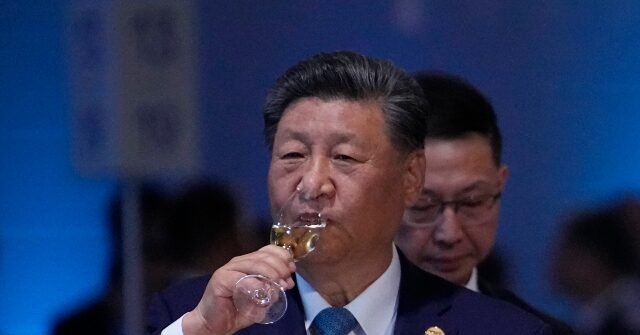China’s Ministry of Commerce (MOFCOM) on Wednesday unveiled a 20-point “action plan” to “stabilize foreign investment” – a tacit acknowledgement that the Communist nation’s tottering economy desperately needs the return of foreign investors scared off by dictator Xi Jinping’s authoritarian tactics and unfair trade policies.
MOFCOM’s action plan was drafted with the assistance of the National Development and Reform Commission, a high-ranking department of the State Council established in 2003 to streamline economic planning. The State Council is effectively Xi Jinping’s Cabinet, so the new action plan is roughly equivalent to a policy document from a Cabinet-level agency.
China’s state-run Global Times summarized the foreign investment stabilization plan on Wednesday:
Among the measures, the plan will encourage foreign companies to make equity investment in China and guide high-quality foreign capital toward long-term investment in China’s publicly listed companies.
China will allow foreign investment companies to utilize domestic loans for equity investment by removing restrictions, encourage multinational corporations to establish investment companies, and make it easier for foreign investors to conduct mergers and acquisitions in China, according to the plan.
These measures will broaden the channels for foreign investment, increase flexibility, and support larger-scale investment in the country, according to some experts.
Xi’s mouthpieces touted the action plan as a bold step forward in his “continuous effort to promote high-level opening up,” as Shanghai University of Finance and Economics professor Xi Junyang put it.
“Opening up” was actually the strategy of Xi’s predecessor Deng Xiaoping, who Xi was relentlessly working to minimize in the history books, casting himself as the most consequential leader since Mao Zedong – until China’s economy began to crumble after the triple shocks of the Wuhan coronavirus pandemic, a real estate crisis that wiped out billions of dollars in value, and Xi’s trade wars with the United States.
The suspicious death of Premier Li Keqiang in 2023 eliminated a popular rival who many Chinese saw as a much better student of Deng’s philosophy. The boldest of critics wondered aloud if China might not have been better off with Li in charge instead of Xi.
“Opening up” is suddenly back in vogue, after Xi’s manic coronavirus lockdowns and regulatory assaults on foreign corporations made overseas investors reluctant to drop big money in China. Chinese government data released last week showed foreign direct investment plummeted by an astounding 99 percent over the past three years, reaching a four-year low in January 2025.
“The decline has narrowed compared to last year, but it is still on a downward trend,” Vice Commerce Minister Ling Ji admitted in a press conference last Thursday, heralding the debut of the 20-point action plan that was rolled out this week.
One of China’s challenges in bringing back direct foreign investment is that the looming real estate catastrophe – which has been looming for the better part of a decade now – caused a dramatic reduction in domestic consumer spending. This made the Chinese market less valuable to foreign investors, when measured against the costs and risks of investing there – a calculation the 20-point action plan seeks to adjust.
Early response from overseas to China’s big play for more foreign capital was rather muted. Chinese state media provided obsessive and triumphant coverage of the announcement, while coverage from foreign media was tepid at best. For the moment, at least, apprehension about the intensifying trade war between China and the United States appears to overshadow enthusiasm about Beijing finally agreeing to let foreign companies fully own the capital they send to China.
Read More: China Finally Addresses Foreign Investment Disaster with ‘Action Plan’


